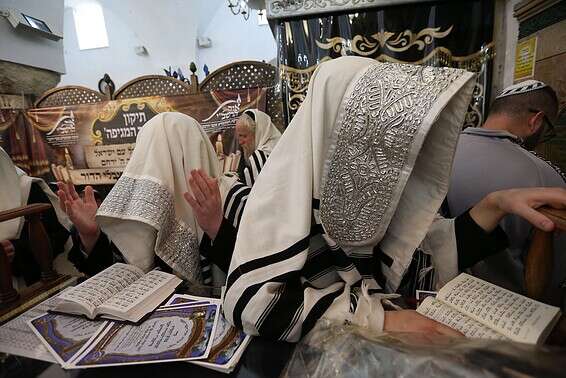Sages believe that the Book of Zohar was originally written by the Rashbi, but it is not clear whether this is the book we have • And we have bad news: the celebration may be celebrated on the wrong day
Lighting a fire in Meron last year
Photo:
David Cohen Ginny
Lag B'Omer, Rabbi Shimon Bar Yochai and the Book of Zohar - this trinity seems particularly holy and ancient, but this week in "The Hidden Torah" we will dive together into the most explosive issue of the Jewish hidden world and try to answer two simple questions: Who wrote the Zohar and whether C. B'Omer is really related to Rashbi.
His first public appearance was recorded by the Zohar in the middle of the 13th century, in Spain.
Then unfamiliar writings began to be published throughout the Jewish world, claiming that their author was no less than the Tanna Rabbi Shimon Bar Yochai, who had lived in Israel for more than a thousand years before.
The man who distributed the writings, Rabbi Moshe di-Leon, claimed that he only copied them in his handwriting from ancient manuscripts he found in the cave.
The new writings were received with mixed admiration in criticism, and one of the sages of the Land of Israel, Rabbi Yitzchak Daman of Acre, set out on a journey to search for the roots of truth. He met Rabbi Moshe Di-Leon in Spain - who promised to show him the ancient manuscripts, but died suddenly before he could do so. When Rabbi Yitzchak questioned Di-Leon's widow, he heard from her that this was a forgery for financial gain; 'My husband,' the woman told him, 'wrote everything from his head and heart. When I asked him why he was telling everyone that this was a copy of ancient letters, he replied: "If I say that I write myself, they will not give me a penny for these writings." Rabbi Yitzchak himself apparently did not accept the widow's testimony, apparently, and adopted the approach that it was an ancient text, but the controversy over the precedence of the Zohar and the identity of its author had already been ignited.
Since then, there has been a great debate within Judaism over whether the Zohar was indeed written by Rabbi Shimon Bar Yochai. Uncharacteristic language disorders and the use of words and later concepts for the time of Rabbi Shimon Bar Yochai are only some of the evidence that the Zohar or parts of it are a late text. The late Ari, one of the greatest sages of Kabbalah in Safed in the 16th century, also feared the intrusion of foreign passages into the Zohar, as testified by his disciple who said that the late Mori would not want to say the same verses mentioned in the Zohar Parashat Black at midnight ... and almost stuttered that they were not the handwriting of the author of the Zohar. "The Yavatz, one of the greatest rabbis of the 18th century, analyzed the Zohar in his book" Handkerchief of Books "and concluded that most of the Zohar is not original but additions by later copyists. Rabbi Hanazir, a disciple of Rabbi Kook, also accepted the claim that the Zohar corrections were "written by the last righteous and saints, at a later time" through the Holy Spirit.
In this context it is worth mentioning that the Zohar is not a book but a collection of books that has been formed over the years.
In fact, there are thousands of different versions of the books of Zohar found in about 650 different manuscripts, with no one knowing for sure who wrote each and every one of the thousands of passages that make up what is today called "The Zohar".
Today, many believe that Rabbi Shimon is indeed the ancient author of the Zohar, but according to scholars, the main suspects in the composition of the Zohar are still Rabbi Moshe Di-Leon and the Kabbalist group that operated in his day, which may have relied on earlier texts from the 11th century.
Lag B'Omer is the day of celebration? Not sure
And what about Lag B'Omer, it's sure Rabbi Shimon Bar Yochai's day of rejoicing, isn't it? - Unfortunately, not sure. According to the narrator in the Zohar, when Rashbi died he told his students the secrets of his Torah, but in Zohar the date on which Rashb died was not mentioned Only among the students of the Aryans, in the 16th century, does a tradition first appear that states that Lag B'Omer is the day of Rashbi's death - but according to the Hida, a halakhic ruling that no one can suspect of foreign motives, the source of this tradition is disruption Copy of the manuscript of Rabbi Chaim Vital, a student of the Aryans: The word "Simchat" in the sentence "Yom Simchat Rashbi" was mistakenly shortened and replaced with the word "Shemet", and thus "Yom Simcha" by Rashbi - Birthday, wedding day Or the day of the ordination to the rabbinate - accidentally became the "day of death".
So even though the bonfires, the potatoes and the other customs and rituals that characterize Lag B'Omer and make it such a beautiful and happy holiday have no source in the Scriptures, and although Rashbi probably did not die on this day at all, nor is it clear whether the Zohar is the pen of the ancient Tanna or Precisely the work of forgers, after all, Lag B'Omer is happy!

